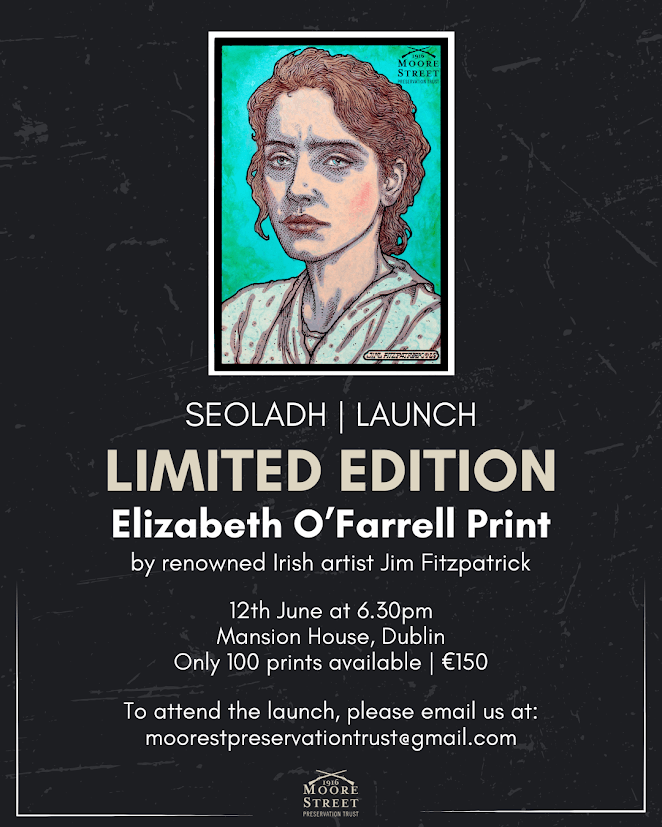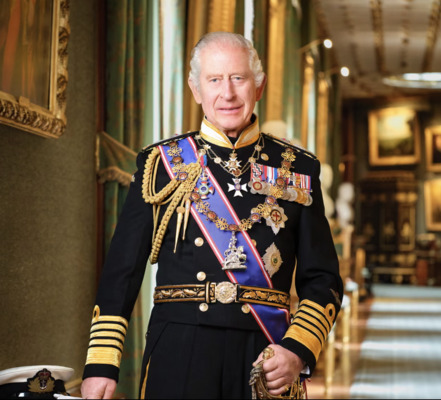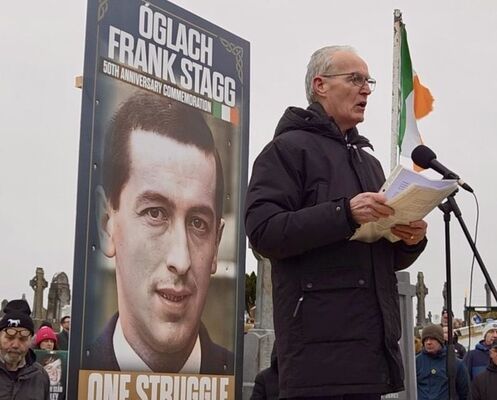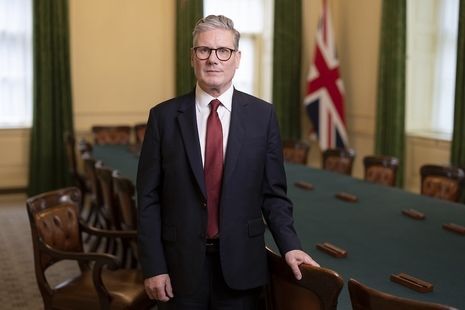REGULAR readers of this column will know that I wholeheartedly support the efforts of the Moore Street Preservation Trust to preserve the 1916 Moore Street battlefield site in Dublin that is under threat from a developer's wrecking ball.
This week the Trust – a not-for-profit organisation led by relatives of the Signatories of the 1916 Proclamation – will launch a new limited edition signed print of Elizabeth O’Farrell by the renowned Irish artist Jim Fitzpatrick. One hundred prints will be available from Thursday evening at €150 as part of the fundraising efforts of the Trust to raise much needed funds in support of its alternative plan for a cultural and historical quarter in the Moore Street battlefield site.
Elizabeth O’Farrell, a member of the Cumann na mBan, was one of three women who were present in the GPO throughout Easter week 1916 and who were evacuated to Number 16 Moore Street as the GPO was in flames. She, her life-long partner Julia Grennan and Winifred Carney were in the room in No.16 when the decision to surrender was taken by Seán MacDiarmada, Pádraig Pearse, Joseph Plunkett, James Connolly and Tom Clarke.
At 12.45pm on Saturday, April 29, O’Farrell was tasked by the leaders with the hazardous responsibility of going to the British lines. Carrying a white handkerchief tied to a pole and wearing a red cross armband, she courageously walked down Moore Street to the British barricade. She was brought from there to Tom Clarke’s shop in Parnell Street where the British Brigadier General William Lowe told her that he would only accept an unconditional surrender.
A short time later Pádraig Pearse, accompanied by O’Farrell and wearing his military overcoat and hat, met General Lowe. In the original photograph taken of that meeting only Nurse O’Farrell’s feet can be seen and in many of the reproductions later they were airbrushed out. O’Farrell delivered the surrender note to the outposts which were still fighting.
She and her partner Julia remained life-long republicans. Elizabeth O'Farrell died in 1957 and was buried in Glasnevin Cemetery. Her tombstone carries a verse:
When duty called on the field of battle,
She went, under orders, the foe to meet,
Bearing sadly, unfearingly, proudly,
The flag of surrender but not defeat.
Jim Fitzpatrick has produced a remarkable portrait of this remarkable and indomitable woman. Support the Moore Street Preservation Trust and buy this historic portrait and unique work of art by one of Ireland’s foremost artists. The print is 40cm x 56cm, is signed by the artist, numbered and on high quality paper.
Go online at the Moore Street Preservation Trust.
Health and care in a New Ireland
Last month the European Movement in Ireland via Amárach Research reported that a majority of people in both parts of the island were in favour of a united Ireland within the EU. The figures were 67 per cent in favour in the North and 62 per cent in favour in the South.
Last week the Life and Times Survey, which is conducted by Queen's University, reported that the gap between those who support the union with Britain and those who favour Irish unity has halved in the last year. In 2021 the gap was 23 points. In 2023 that had halved to 12 points. This year it has halved again to five points.
In all of the polls a key issue of public concern that emerges again and again is the question of health provision. People want to know what an all-island health service will look like. Sinn Féin favours an Irish National Health and Care Service, centrally funded, universal, free at the point of delivery and based on clinical need.
Currently health care provision across the island is in crisis and the health needs of citizens are not being met. A united Ireland provides an opportunity for the transformation of health and social care services. In addition to greater cross-border healthcare planning and delivery, and increased collaboration on joint projects, citizens would be much better served by a healthcare system that is planned, managed and delivered based on the needs of the national population.
An Irish National Health and Care Service is a common sense and achievable proposition. There are already many areas of cooperation across the two health systems. These need to be supported by the full integration of health provision across the island of Ireland and a national health strategy.
As part of the discussion on this very important issue last Friday over 100 health professionals met in St Comgall’s – Ionad Eileen Howell – for a conference on Health and Care in the New Ireland. The event was organised by Sinn Féin’s Commission on the Future of Ireland. The conference was opened by the party’s health spokesperson in the Oireachtas, David Cullinane TD, and the main address was delivered by Pat Cullen MP. Philip McGuigan MLA, the Sinn Féin spokesperson in the North, was also in attendance.
The independent panel was chaired by Tom Murray, President of the Irish Pharmacy Union, and included Majella Beattie of Care Champions Ireland; Dr. Eddie Rooney, former Chief Executive of the Public Health Agency; and Sara Boyce of the New Script for Mental Health Campaign.
The panelists spoke of their experience in health and care provision and the gaps that currently exist. The importance of investing in mental health provision, new infrastructure, disability care, and improved provision for our elderly citizens were all discussed by the panel and audience. The panelists spoke of the health challenges in the promotion and prioritisation of health care, their concerns at the diagnostic waiting times, particularly in respect of cancer, and the underfunding of counselling services.
The vital role played by the voluntary and community sector, and charities, in improving capacity North and South was praised.
Pat Cullen MP told the conference: “Successive Irish and British governments have not prioritised our public health services. They have failed to plan services according to need, to train and retain enough health and social care professionals, or to modernise health and care provision for the 21st century. The gap between public and private health care is growing in the South’s two-tier health service, despite the all-party commitment to Sláintecare. Little progress has been made towards realising that vision.”
Waiting times have also grown unacceptably long in the North, where the crisis is exacerbated by the financial control of Westminster and the impact of partition on our ability to make decisions that maximise the all-island potential.
The reality is that all island cooperation and planning makes sense. On an island of under seven million people – less than the population of most of the world’s great cities – it makes no sense having two separate health services. A united Ireland provides an opportunity for the transformation of the health and social care services.
An act of international piracy
In an act of international piracy Israeli forces hijacked the humanitarian aid vessel the Madleen in international waters as it was making its way to the Gaza Strip with much-needed humanitarian aid for the beleaguered community. The Madleen is part of the pro-Palestinian Freedom Flotilla Coalition and it had a crew of 12, including environmental activist activist Greta Thunberg and Rima Hassan MEP. The Israel action is part of its strategy to control the public narrative around events in the Palestinian occupied territories, particularly Gaza, where millions face starvation.
HIJACKED: The crew of the Madleen before they were kidnapped by Israel in international waters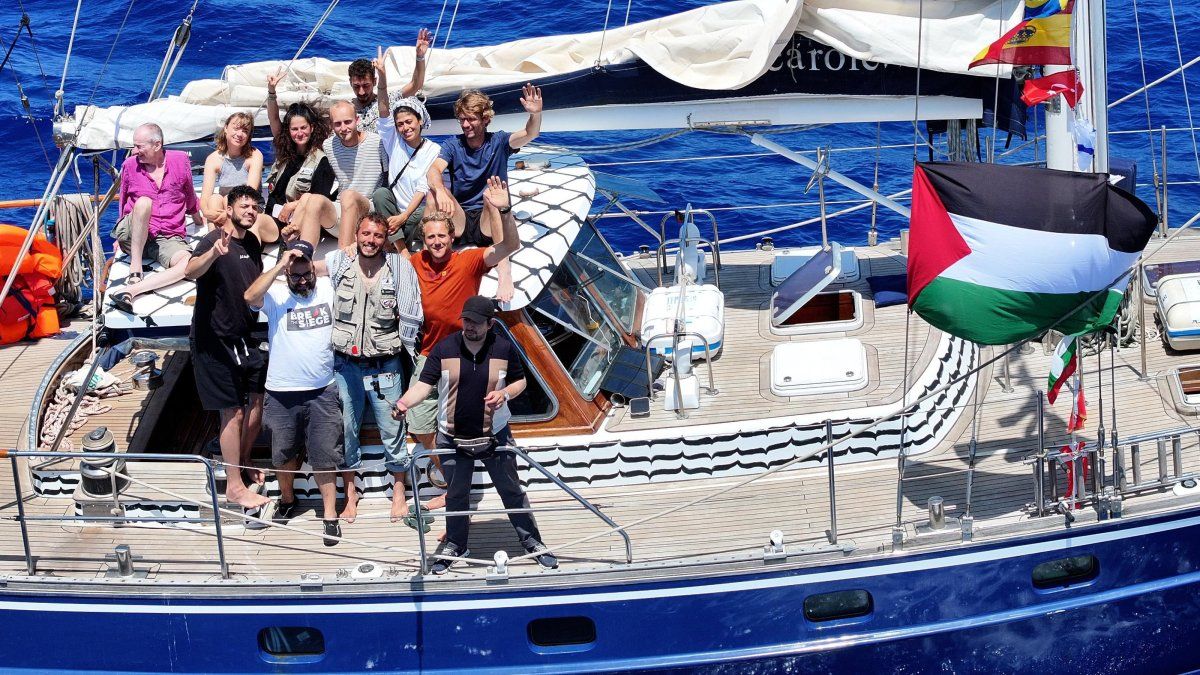
In the Gaza Strip and the West Bank the daily slaughter of innocents by the Israeli regime’s murder squads continues unimpeded. So too does the deliberate targeting of the health service, which has been all but obliterated by Israel’s genocidal military campaign. The objective is clearly to remove all Palestinians from Gaza.
Finally, I want to commend the thousands who participated in and/or supported the 25-mile March for Gaza last Saturday from Lurgan to Omeath. The length of the march represented the length of the Gaza Strip.
The refusal of most western governments and the European Union to take effective measures against the Israeli state for these war crimes makes them complicit. We must keep up the pressure for a permanent ceasefire, humanitarian aid and freedom for the Palestinian people.

